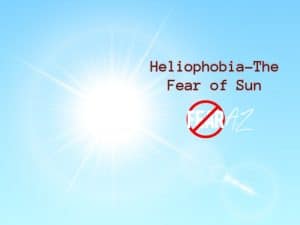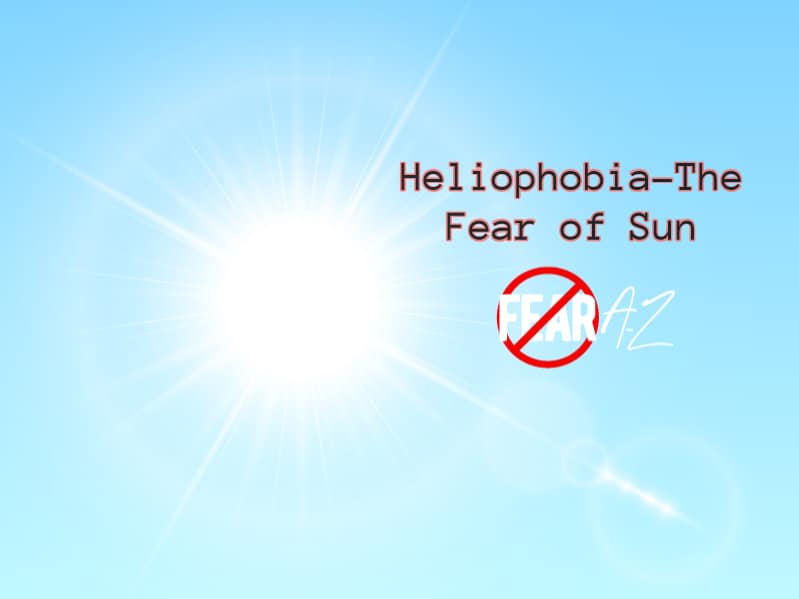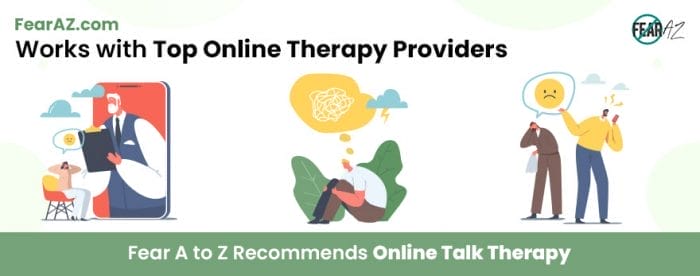Share This Article
Putting the Spotlight on the Fear of the Sun
Do you worry that the glorious, blazing sun is your sworn enemy? Do you avoid it at all costs or take serious protective measures when forced to go out in the sunshine?
The anxiety you feel when you’re out in the sun and the breathlessness you experience afterward—there’s no way to explain these things to anyone.
It can be challenging and exhausting to live with this fear. You may also fear that if you tell someone about this, they won’t understand you and may even ridicule you.
The good news is that you don’t have to live with this fear. There are ways to cope with it and lead a normal life like everyone else. So, how do you deal with heliophobia? Read on to learn more.

Possible Heliophobia Causes
Like all other phobias, there’s no specific cause as to why someone may have this phobia. However, in some cases, you may have been traumatized by an incident in the past that included a severe sunburn, and now you’re afraid to go out in the sun for fear of it happening again.
Having heliophobia can also be a learned response from your parents, who may have had the same fear as you. Most of the time, a phobia will have a genetic or heritable link.
Some Things You Need to Know about Heliophobia
We can categorize all phobias into two types: fear and disgust. Fear is generally a reaction to a survival threat, while disgust is primarily connected to contamination or a possible threat. Heliophobia is considered a fear since people who suffer from it feel constantly anxious that they will die of skin cancer or another deadly disease.
People who have this phobia may go to great lengths to avoid encountering the sun; even the thought of the sun can bring on feelings of panic. Like any other phobia, heliophobia can interfere with your ability to socialize, which can reduce your quality of life.
As a heliophobic, you may never venture outdoors during the day. Or you may wear a lot of clothing, apply sunscreen generously to exposed skin, and wear dark sunglasses.
Heliophobia Symptoms
All phobias are characterized by objects or things that trigger fear and anxiety in you. However, you will find similar symptoms across all phobias. Here are some physical and psychological symptoms of heliophobia.
The physical symptoms of heliophobia are:
- Difficulty breathing
- Nausea
- Dry mouth
- Increased heart rate
- Uncomfortable trembling
- Feeling dizzy
- A choking sensation
The psychological symptoms of heliophobia are:
- Anxiety attacks
- Uncontrollable thoughts
- Fear of losing control
- Not being able to step outside
- Getting very upset
As a sufferer, you may find one or all of the symptoms mentioned above, depending on the severity of your phobia.
How Is Heliophobia Diagnosed?
You need to visit a doctor or therapist who can diagnose this fear. They will discuss your symptoms with you, both physical and psychological. They will also review your social, medical, and psychiatric history to evaluate the severity of your phobia or anxiety.
Be sure to tell your doctor or therapist about your family’s phobia history, too, as that will help in the diagnosis process.
Heliophobia Treatments
Like any other phobia, there are treatment options that can help you cope with the fear of the sun. While you can opt for professional treatment, self-help has benefitted some who have heliophobia.
If you find self-help methods are not improving your symptoms, professional treatment might be in order. Those who are having frequent panic attacks and feel their phobia is something impossible to control should visit a doctor or therapist as soon as possible.
When Should You Seek Treatment for Heliophobia?
Many people who have mild heliophobia are able to step out of their house and, sometimes, lead a normal life. But each individual is different. So if your phobia seems to be getting worse by the day, seek treatment.
When Should a Person Seek Treatment
- When it is getting more difficult each passing day to lead a normal life
- When your symptoms are getting worse each day
- When you are having frequent panic attacks
The symptoms above show up in severe cases of heliophobia, but you shouldn’t wait until it gets worse before getting help. The sooner you seek help for your phobia, the more likely you are to overcome it.
Self-Help
When you start working on your own fear, you gain a different perspective you may have been missing before. There is no fear of judgment here, and since you are the only one who knows what you’re going through, you’ll better understand your phobia. You may be able to develop a plan to completely rid yourself of this fear or at least be better able to manage it.
During this time, you might also be able to share your phobia experience with a therapeutic group of community of members like you. You can also focus on replacing your negative thoughts with positive ones.
Meditation
Through meditation you can learn how to calm yourself during anxiety attacks. You will be better equipped to take control of your life and your feelings and train your mind not to dwell on your fears. Meditation can also help you live in the present, which reduces the impact of childhood trauma.
Additional Self-Help Tips
- Share your feeling with your family and friends
- Recognize your feelings and thoughts
- Partner up
- Join group therapies
- Practice breathing techniques and yoga
Professional Treatments
If you find self-help options aren’t effective, visit a doctor to get a personalized plan on how to manage your phobia. Some of the professional treatments for heliophobia include cognitive behavioral therapy (CBT), exposure therapy, and mindfulness-based stress reduction (MBSR).
Exposure Therapy
Exposure therapy has been proven effective for phobias time and time again. You are exposed to your fears in a controlled environment until you become accustomed to them.
Mindfulness-Based Stress Reduction (MBSR)
An eight-week, evidence-based mindfulness program, MBSR helps people who suffer from anxiety, stress, depression, or other mental ailments. The purpose of this course is to provide systematic training in mindfulness. It also helps you develop the ability to cultivate a compassionate, conscious attitude towards your thoughts, emotions, body sensations, and impulses.
Cognitive Behavioral Therapy
Cognitive behavioral therapy utilizes techniques similar to exposure therapy to help you understand your emotions, behaviors, and thoughts more fully. Your therapist will give you several exercises to help you cope with your phobia and reduce anxiety.
Learning to Cope with Heliophobia
The techniques mentioned above have been proven beneficial for many, but they may not work for you or completely eradicate your phobia. They will, however, definitely help you understand your thoughts and feelings better. This will eventually help you deal with your fear.
An uncommon phobia such as heliophobia can affect your life in various ways. It may make you doubt your own feelings and thoughts. But this phobia can be managed. With proper treatment, you’ll be able to hang out with friends in broad daylight and maybe even go to a beach on a sunny day.





